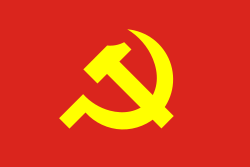| Secretary of the Central Military Commission | |
|---|---|
| Bí thư Quân ủy Trung ương | |
 Emblem of the Communist Party of Vietnam | |
 Flag of the Communist Party of Vietnam | |
| Central Military Commission | |
| Term length | Five years |
| Inaugural holder | Võ Nguyên Giáp |
| Formation | 1946 |
| Deputy | Deputy Secretary |
 |
|---|
| |
The Secretary of the Central Military Commission of the Communist Party of Vietnam is the highest party official on military affairs in Vietnam, and politically the highest leader of the People's Army of Vietnam, making the officeholder the de facto Commander-in-Chief of the Armed Forces.










